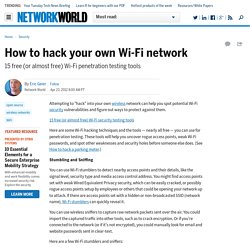

EH-Net Online Mag - Free Online Magazine for the Security Professional. How to hack your own Wi-Fi network. Attempting to "hack" into your own wireless network can help you spot potential Wi-Fi security vulnerabilities and figure out ways to protect against them. 15 free (or almost free) Wi-Fi security testing tools Here are some Wi-Fi hacking techniques and the tools — nearly all free — you can use for penetration testing.

These tools will help you uncover rogue access points, weak Wi-Fi passwords, and spot other weaknesses and security holes before someone else does. (See How to hack a parking meter.) Stumbling and Sniffing You can use Wi-Fi stumblers to detect nearby access points and their details, like the signal level, security type and media access control address. You can use wireless sniffers to capture raw network packets sent over the air.
Here are a few Wi-Fi stumblers and sniffers: Vistumbler is an open source Windows application that displays the basic access point details, including the exact authentication and encryption methods, and can even speak the SSID and RSSI. How to Stop Hackers from Invading Your Network: 13 Steps. Edit Article Unethical hackers (in bad sense of this word) are always looking for weaker points in a network system to hack the security system of your company and get a hold of confidential and new information.

Some "black-hat hackers" derive a vicarious pleasure from wreaking havoc on security systems and some hackers do it for money. Whatever may be the reason, malicious hackers are giving nightmares to companies and organizations of almost all sizes. Especially, large corporate houses, banks, financial institutions, security establishments are favorite targets for hackers. Hacking - What is a Hacker in Computer Networking? Question: What is a Hacker?

Answer: In computer networking, hacking is any technical effort to manipulate the normal behavior of network connections and connected systems. A hacker is any person engaged in hacking. How to gain access to all accounts on a school/work network. How to Hack Your Own Network and Beef Up Its Security with Kali Linux. Network Hacking. Quantum Cryptography Is Safe Again. In theory, so-called quantum cryptography provides a totally secure way of sending information.

Long-Distance Quantum Cryptography. Using the quirky laws of quantum physics to encrypt data, in theory, assures perfect security.

NSA misuse of mathematics: Secret formulas and backdoor cryptography. The Artist of the Unbreakable Code - Issue 6: Secret Codes. It was the year of Queen Victoria’s Diamond Jubilee, 1897.

Through a periscope, England was sailing along in all its hope and glory. That summer Edward Elgar turned 40 and was slowly emerging as the country’s greatest composer. Quantum cryptography: yesterday, today, and tomorrow. Quantum cryptography is one of those amazing tools that came along before anyone really asked for it.

Somehow there are companies out there selling very high end, and "provably secure" cryptography gear, all based on fundamental principles of quantum mechanics. Yet, despite being fundamentally unbreakable, there have been quite a few publications on more-or-less practical ways for Eve to eavesdrop on people whispering quantum sweet-nothings in darkened rooms. How the NSA (may have) put a backdoor in RSA’s cryptography: A technical primer. Author Nick Sullivan worked for six years at Apple on many of its most important cryptography efforts before recently joining CloudFlare, where he is a systems engineer.

He has a degree in mathematics from the University of Waterloo and a Masters in computer science with a concentration in cryptography from the University of Calgary. This post was originally written for the CloudFlare blog and has been lightly edited to appear on Ars. The NSA and cryptography: Cracked credibility. Cryptography Breakthrough Could Make Software Unhackable. As a graduate student at the Massachusetts Institute of Technology in 1996, Amit Sahai was fascinated by the strange notion of a “zero-knowledge” proof, a type of mathematical protocol for convincing someone that something is true without revealing any details of why it is true.

As Sahai mulled over this counterintuitive concept, it led him to consider an even more daring notion: What if it were possible to mask the inner workings not just of a proof, but of a computer program, so that people could use the program without being able to figure out how it worked? The idea of “obfuscating” a program had been around for decades, but no one had ever developed a rigorous mathematical framework for the concept, let alone created an unassailable obfuscation scheme.
Over the years, commercial software companies have engineered various techniques for garbling a computer program so that it will be harder to understand while still performing the same function. A (relatively easy to understand) primer on elliptic curve cryptography. Author Nick Sullivan worked for six years at Apple on many of its most important cryptography efforts before recently joining CloudFlare, where he is a systems engineer.

An Overview of Cryptography. As an aside, the AES selection process managed by NIST was very public. A similar project, the New European Schemes for Signatures, Integrity and Encryption (NESSIE), was designed as an independent project meant to augment the work of NIST by putting out an open call for new cryptographic primitives. NESSIE ran from about 2000-2003. While several new algorithms were found during the NESSIE process, no new stream cipher survived cryptanalysis.
As a result, the ECRYPT Stream Cipher Project (eSTREAM) was created, which has approved a number of new stream ciphers for both software and hardware implementation. Similar — but different — is the Japanese Government Cryptography Research and Evaluation Committees (CRYPTREC) efforts to evaluate algorithms submitted for government and industry applications. Reporting Computer Hacking, Fraud and Other Internet-Related Crime. The primary federal law enforcement agencies that investigate domestic crime on the Internet include: the Federal Bureau of Investigation (FBI), the United States Secret Service, the United States Immigration and Customs Enforcement (ICE) , the United States Postal Inspection Service, and the Bureau of Alcohol, Tobacco and Firearms (ATF) .
Each of these agencies has offices conveniently located in every state to which crimes may be reported. Contact information regarding these local offices may be found in local telephone directories. In general, federal crime may be reported to the local office of an appropriate law enforcement agency by a telephone call and by requesting the "Duty Complaint Agent. " Each law enforcement agency also has a headquarters (HQ) in Washington, D.C., which has agents who specialize in particular areas. For example, the FBI and the U.S. For more information about cyber crimes please feel free to visit the Department of Justice's Cyber Crime website at.
Cybercrime - Computer Crimes Security - Online Fraud - Email Phishing Scams. Over the last 18 months, an ominous change has swept across the Internet. The threat landscape once dominated by the worms and viruses unleashed by irresponsible hackers is now ruled by a new breed of cybercriminals. Cyber Crime & Information Systems Security — Central Piedmont Community College. The Computer Technology Integration (CTI) degree combined with special skills attained through the D25500-D6 diploma prepares individuals with the skills required to implement effective and comprehensive information security controls.
Course work includes networking technologies, operating systems administration, information policy, intrusion detection, security administration, and industry best practices to protect data communications. Graduates should be prepared for employment as security administrators. Additionally, they will acquire the skills that allow them to pursue security certifications. This field expects explosive growth for at least the next decade. Students receive significant hands on experience in the study of Security Infrastructure and Administration. Russian Gang Amasses Over a Billion Internet Passwords.
A Russian crime ring has amassed the largest known collection of stolen Internet credentials, including 1.2 billion user name and password combinations and more than 500 million email addresses, security researchers say. The records, discovered by Hold Security, a firm in Milwaukee, include confidential material gathered from 420,000 websites, including household names, and small Internet sites. Log In - The New York Times. The Hacker News — Hacking, Cyber and Internet Security. Hackers breach some White House computers. History, Travel, Arts, Science, People, Places. Computer Viruses Are "Rampant" on Medical Devices in Hospitals.
Health scare: Much hospital equipment uses software that can be vulnerable to viruses. Computerized hospital equipment is increasingly vulnerable to malware infections, according to participants in a recent government panel. These infections can clog patient-monitoring equipment and other software systems, at times rendering the devices temporarily inoperable. While no injuries have been reported, the malware problem at hospitals is clearly rising nationwide, says Kevin Fu, a leading expert on medical-device security and a computer scientist at the University of Michigan and the University of Massachusetts, Amherst, who took part in the panel discussion. Software-controlled medical equipment has become increasingly interconnected in recent years, and many systems run on variants of Windows, a common target for hackers elsewhere.
Mossad's Miracle Weapon: Stuxnet Virus Opens New Era of Cyber War. How IBM is making computers more like your brain. For real. Allen Institute’s Christof Koch on Computer Consciousness. Physics: Quantum computer quest. Equinox Graphics/SPL. Meet the men who spy on women through their webcams. How Apple and Amazon Security Flaws Led to My Epic Hacking.
“The Equation group:” Hackers have infected computers worldwide with the sneakiest malware ever. How to Keep Your Online Business Information Secure — Some Basics. Five ways to secure your organization's information systems. Hacker School. What is a Hacker? How To Become A Hacker. An Inside Look at Anonymous, the Radical Hacking Collective - The New Yorker. Hacktivist Group Anonymous Launches Cyber War On ISIS. Anonymous speaks: the inside story of the HBGary hack. Hacking Tutorials 101. Computer Hacking 101 - Real Simple. Hacking 101: How to Break Into Computers.
How to Hack: 12 Steps. How to be a Computer Hacker. Spying Campaign Bearing NSA's Hallmark Found Infecting Thousands of Computers - Bloomberg Business. How the NSA Plans to Infect 'Millions' of Computers with Malware.